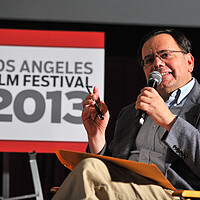‘Steve! (Martin)’ review: The wild and crazy (and private) guy shares his story
Loading...
Morgan Neville’s excellent documentary “Steve! (Martin): A Documentary in 2 Pieces” reminds me of how unreasonably happy Steve Martin made me feel when I first caught his act in the mid-1970s. At a time when so much stand-up comedy was acridly political, he turned high-style goofiness into an art form.
The film is split into two stylistically very different 90-minute sections, entitled “Then” and “Now.” The first section, often accompanied by his wry commentary, relies heavily on archival footage of Martin’s life and career up to around 1980. That’s when he stopped doing stand-up and segued full time into making movies.
The second section is largely filmed vérité-style in the present day, with Martin talking about his projects and friendships and regrets. Martin Short, his co-star in their hit TV series “Only Murders in the Building,” often joins in, maybe a tad too excessively. They mostly try to crack each other up. Above all, Martin talks about the contentment he has finally achieved with his wife and young daughter after so many years feeling anxious and lost. He says he has found the life he never thought he would have.
Why We Wrote This
Steve Martin is known for turning high-style goofiness into an art form, the Monitor’s film critic writes. A new documentary offers the notoriously private entertainer an opportunity to consider what it takes for a funnyman to find happiness.
As the “Then” section demonstrates, Martin’s ascent to the highest reaches of comedy was a long haul. Growing up in California’s Orange County, he could never please his father, whose own dreams of acting success were dashed by having to support a family. There’s a telling anecdote in which Martin’s father attends the premiere of “The Jerk,” his son’s first hit movie, and afterward tells him, “You’re no Charlie Chaplin.”
Martin worked as a kid at Disneyland and learned how to create funny balloon animals and do magic tricks. What he realized was that people loved it when the tricks didn’t work. This became the inciting idea for his comic persona: an arrogant comedian who thinks he’s funny and isn’t. While struggling to make it in the comedy clubs, he majored in philosophy in college. Instead of pondering whether God exists, he was intent on discovering how to get laughs. His offstage demeanor was as analytical as his onstage character was screwball.
This temperamental split is not uncommon among show business performers, particularly comics, who tend to be a rather morose bunch when not in the spotlight. What’s different about Martin is that at the height of his stand-up fame, when he was selling out stadiums and racking up platinum comedy albums, he recognized that, in his words, “there was nothing more to develop.” He had created a dead end. Only in the past few years, touring with Short onstage, has he once again ventured in front of a live audience.
Notoriously private, Martin says he decided to participate in this documentary because he thought it might help him to understand himself. That’s a rather heavy burden to place on a filmmaker, but Neville keeps things loose in the second half, never over-psychoanalyzing or playing up the happy-sad clown trope.
My one issue with the film, which also features input from the likes of Jerry Seinfeld and Tina Fey, is that it skimps on Martin’s vast artistic achievements. “Pennies From Heaven,” which, against all expectations, he made after “The Jerk,” is one of the darkest, and greatest, musicals ever made. (It flopped commercially.) The Cyrano update, “Roxanne,” which he wrote, is a masterpiece that shows off Martin as perhaps the finest physical comic since Buster Keaton. He has written first-rate plays, novels, memoirs, comic essays. He’s even a top-flight banjo player. He’s probably the most wildly versatile comic artist we’ve ever had. Out of an overweening sense of modesty, perhaps, this won’t really come across to the uninitiated.
“How did this happen?” a frankly bemused Martin asks himself near the end as he surveys the astonishing trajectory of his life. Neville’s documentary comes perhaps the closest anyone will ever get to answering that question, but inevitably, the wellsprings of Martin’s genius remain a mystery.
Peter Rainer is the Monitor’s film critic. “Steve! (Martin): A Documentary in 2 Pieces” is available on Apple TV+. It is rated TV-MA, for mature audiences.








